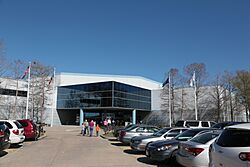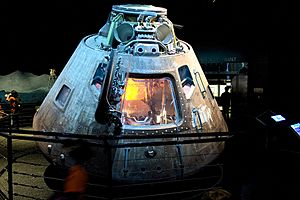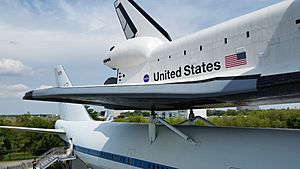Space Center Houston facts for kids

Entrance to the Space Center Houston
|
|
| Location | 1601 NASA Parkway Houston, Texas 77058 US |
|---|---|
| Coordinates | 29°33′07″N 95°05′54″W / 29.5518812°N 95.0983429°W |
| Status | open |
| Opened | October 16, 1992 |
| Owner | NASA |
| Operated by | Manned Spaceflight Education Foundation |
| Theme | NASA and space exploration |
| Operating season | Closed on Christmas Day and Thanksgiving |
| Attendance | >1 million (2022) |

Space Center Houston is an exciting science museum. It is the official visitor center for NASA's Johnson Space Center in Houston, Texas. This center is where astronauts train and where Mission Control guides space missions.
In 2014, Space Center Houston became a Smithsonian Affiliate museum. NASA owns the center, and a non-profit group called the Manned Spaceflight Education Foundation operates it. The museum opened in 1992. It replaced an older visitor center. Space Center Houston is very large, covering about 250,000 square feet. It displays over 400 real space artifacts. These include famous spacecraft like the Mercury 9, Gemini 5, and Apollo 17 capsules.
Contents
Amazing Spacecraft Gallery
This special gallery shows off many real spacecraft and training models. You can see incredible pieces of space history here:
- The Mercury 9 capsule, named Faith 7. Astronaut Gordon Cooper flew it in 1963.
- The Gemini 5 capsule. Gordon Cooper and Pete Conrad flew this one in 1965.
- The Apollo 17 Command Module America. This spacecraft orbited the Moon 75 times in 1972. It was part of the last crewed mission to the Moon. Astronauts Gene Cernan, Ronald Evans, and Dr. Jack Schmitt were on board.
- A Lunar Module test vehicle (LTA-8).
- A Lunar Roving Vehicle Trainer, used to practice driving on the Moon.
- The Lunar Samples Vault, which holds pieces of the Moon.
- A Lunar touchstone, one of only eight Moon rocks in the world you can touch!
- The Skylab 1-G Trainer, used to practice living in space.
- The Apollo-Soyuz Test Project docking module trainer. This was used for a historic meeting in space between American and Russian spacecraft.
Independence Plaza: Shuttle and Carrier Aircraft

Independence Plaza is a huge exhibit at Space Center Houston. It features the world's only Space Shuttle replica. This replica sits on top of one of the original Shuttle Carrier Aircraft. It is the only place where visitors can go inside both vehicles.
The Space Shuttle replica is called Independence. It used to be known as Explorer. It was moved here from Kennedy Space Center. This move made space for the real Space Shuttle Atlantis there. Independence now rests on NASA 905. This is a retired Shuttle Carrier Aircraft. On August 14, 2014, a big lift called "The Rise of Independence" placed the shuttle replica onto the plane. The plane itself arrived at Space Center Houston on April 30, 2014. It was transported from Ellington Airport.
Space Center Houston was considered as a home for a retired Space Shuttle. However, other museums were chosen instead.
Rocket Park: Giant Saturn V Rocket
Rocket Park is home to an amazing Saturn V rocket. This rocket is special because it is made of parts originally meant for flight. These parts were for missions that were later cancelled. The first stage is from SA-514 (for Apollo 19). The second stage is from SA-515 (for Apollo 20). The third stage is from SA-513. The Apollo Command/Service Module CSM-115a completes the rocket.
The Saturn V rocket is on loan from the Smithsonian. It was displayed outside the Johnson Space Center from 1977 to 2004. It was carefully restored with help from various grants and private donations.
An open-air tram tour takes you into the Johnson Space Center. You can visit Building 30, which has the historic Mission Operations Control Room 2. You can also see Building 9, where astronauts train. The tour also stops at Rocket Park to see the restored Saturn V rocket.
Mission Mars: Journey to the Red Planet
The "Mission Mars" exhibit opened in January 2017. NASA helped develop it. This exhibit focuses on how NASA is planning for future trips to Mars. Mission Mars teaches visitors about the planet. It uses fun activities to make you feel like you are on the Martian landscape. You can experience a virtual reality wall and see real-time weather forecasts for Mars. There is even a Mars meteorite that you can touch! Visitors can also see a full-size Orion research capsule. You can try an Orion spacecraft simulator. You can also get a close look at the next generation of Mars rovers.
Other Exciting Exhibitions and Experiences
- Tram Tours: These tours give you a guided look at NASA Johnson Space Center. You can see the historic Mission Control center, Rocket Park, and astronaut training areas.
- Astronaut Gallery: This gallery shows a large collection of spacesuits. It includes Pete Conrad's Apollo 12 moonwalk suit.
- Space Center Theater: This theater is five stories tall. It shows films like EVA 23 and Mission Control: The Unsung Heroes of Apollo.
- Destiny Theater: This theater has a high-definition screen. It shows a short film called Human Destiny.
- Living in Space: This is a live show that uses special projection technology. It helps explain what daily life is like on the International Space Station.
- Mission Briefing Center: Here, you can watch live presentations. They give updates on current NASA missions.
- International Space Station Gallery: This exhibit lets you see what it's like inside the space station.
- Talon Park: A pair of NASA T-38 Talon jets greet visitors at the entrance to Space Center Houston.
Education and Learning Programs
Space Center Houston's education department is a top resource for science learning. Their programs follow national science standards. They focus on hands-on activities in science, technology, engineering, and math (STEM). These programs help inspire learning and build problem-solving skills. They are especially focused on human spaceflight and exploration. Programs include:
- Day camps
- Distance learning
- Field trips
- Girls STEM Academy
- Home School Days
- Overnight experiences
- Scout Camp-Ins
- Sensory Friendly Evenings
- Space Center U
- Space Exploration Educators Conference
- Stars & STEM
- Team building for corporations
Images for kids
-
Mercury Faith 7, piloted by Mercury astronaut Gordon Cooper in 1963
-
The Gemini 5 space capsule which flew Gordon Cooper and Pete Conrad into low Earth orbit in 1965
-
Apollo 17's Command Module America flew Gene Cernan, Ronald Evans, Harrison Schmitt, and five mice to the Moon in NASA's last crewed lunar mission, 1971
-
Apollo 11 Command Module Columbia was exhibited at the Space Center in 2017 during a commemorative tour
See also
 In Spanish: Centro Espacial Houston para niños
In Spanish: Centro Espacial Houston para niños
 | Audre Lorde |
 | John Berry Meachum |
 | Ferdinand Lee Barnett |










